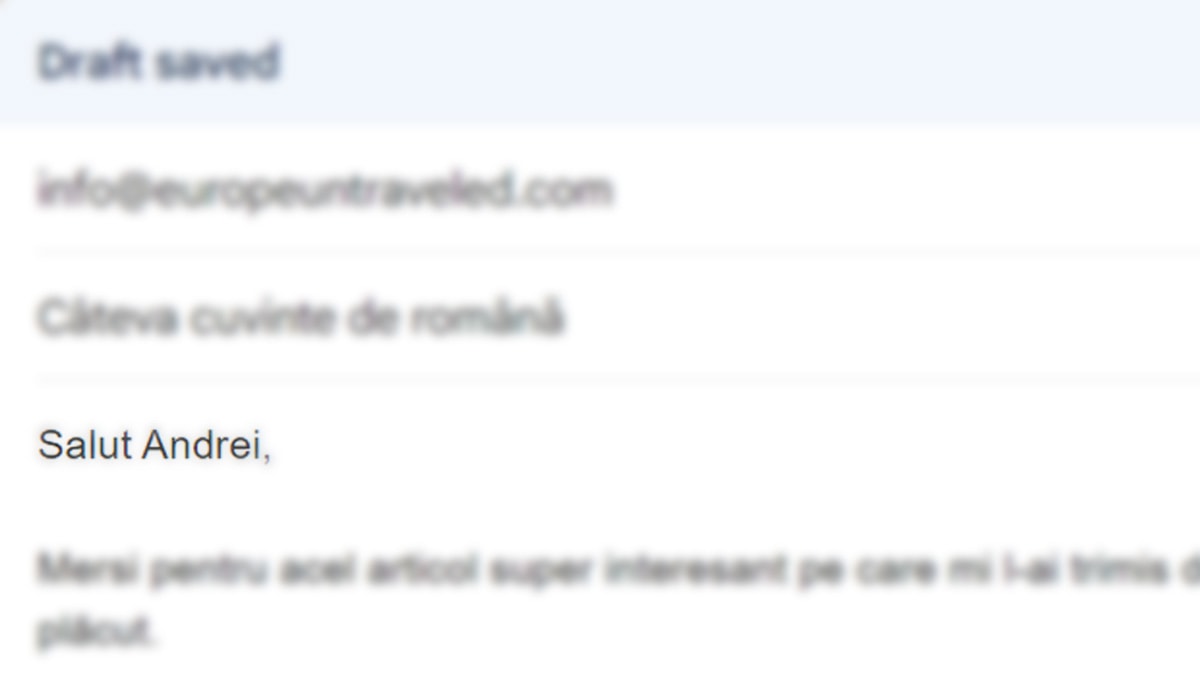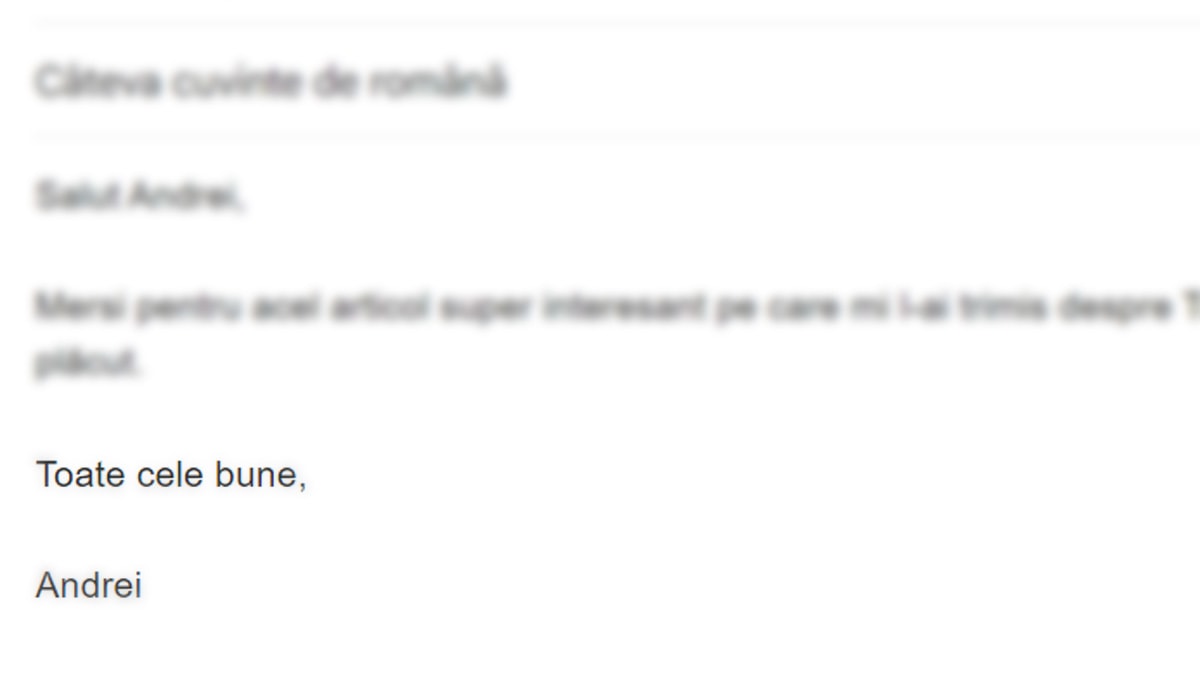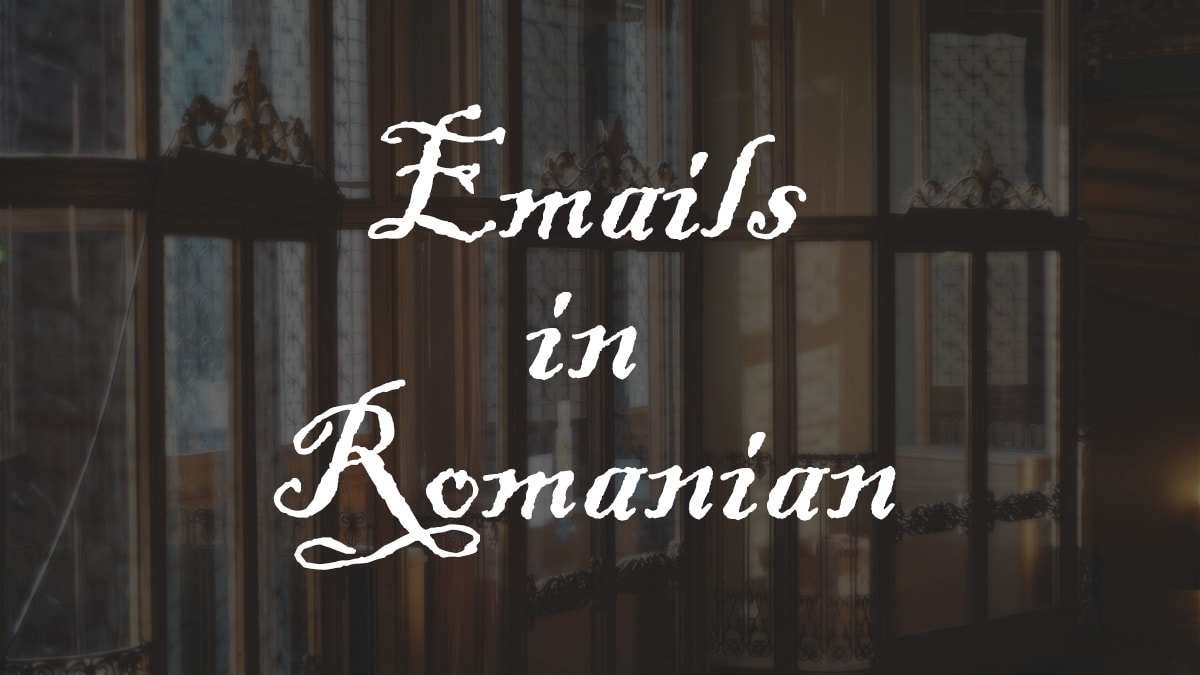If you’re moving to Romania or you use Romanian at work, then writing emails in Romanian is a crucial skill you’ll need to master.
Romanian is a formal language and it’s important to select the right phrases and grammar to make a good impression and not cause offence. Some phrases in Romanian are reserved for friends and family, while others are appropriate for communicating with your boss.
In this guide, I’ll cover the best ways to begin and end your emails and in Romanian.

How to Begin an Email in Romanian
Beginning an email in Romanian, as in English, requires you to use a greeting or salutation. Emails in Romanian can be either formal or informal, so you should choose a greeting that matches the tone and purpose of your email. Some greetings are gender-specific, while other greetings are gender neutral.
Here are the most common email greetings in Romanian:
1. Bună ziua
This is a popular and universal way to begin an email in Romanian. Bună ziua, which means hello (literally good day), can be used in both formal and informal emails, and is perfectly acceptable in nearly all situations.
To use this greeting, simply use the phrase bună ziua followed by the recipient’s first name. For example, “Bună ziua John,”. If you’re addressing your email to multiple people, or if it’s unclear whom you’re writing to, you can simply begin with “Bună ziua,”, without adding a name.
2. Bună
A shortened form of “Bună ziua”, bună is a frequently used greeting in emails between friends and colleagues with whom you have a working relationship. It’s slightly less formal than “Bună ziua”, but still acceptable in formal situations where you have an established relationship with the recipient.
To use this greeting, simply use the phrase bună followed by the recipient’s first name. For example, “Bună John,”.
3. Salut
Salut is a popular way to begin emails to friends and family. It’s an informal greeting, so it can be used with close colleagues who are friends, but not with your boss or superiors. If you’re not sure whether your relationship with the recipient is friendly enough to use salut, then it’s better to use the default “Bună ziua”, instead.
To use salut in an email, just use the word salut followed by the recipient’s first name. For example, “Salut John,”. It may also be used alone, without the recipient’s name (e.g. “Salut,”).
4. Dragă
Dragă is a formal and standard way to address someone in an email or letter. Dragă translates literally to “Dear”, so English speakers will be familiar with it. It’s a bit old-timey, though, so you don’t see it used as much these days. It’s appropriate for formal situations, like wedding invitations or certain business communications.
To use dragă in an email, use the word dragă followed by the recipients first name. E.g. “Dragă Andrei,”.
5. Stimate Domnule / Stimată Doamnă
The most formal of these options, Stimate Domnule / Stimată Doamnă translate literally to “Esteemed Sir” and “Esteemed Madame”.
This salutation is perhaps the most formal salutation in the Romanian language. It’s not something you would use between family or friends, but it’s quite appropriate if you’re writing to a politician, diplomat, embassy employee, university rector, or business executive.
Be careful using this salutation, as it is a gender-specific expression. Therefore, for male recipients you should use “Stimate Domnule” and for female recipients you should use “Stimată Doamnă”.
This greeting is used without a first name. The words for sir and madame act as placeholders. So, to use this salutation, you simply need to include it at the beginning of your email with a comma. E.g. “Stimată Doamnă,”.

How to End an Email in Romanian
Ending an email in Romanian requires you to use a sign-off word or phrase. Whereas addressing someone with an improper greeting may cause offence in Romanian, sign-offs are a bit more universal. Nonetheless, we can broadly categorize email endings/sign-offs as either formal or informal.
Informal ways to end an email in Romanian:
- Mersi — thanks (informal)
- O zi bună — have a good one
- O zi ușoară în continuare — have a good rest of your day
- Gânduri bune — good thoughts
Formal ways to end an email in Romanian:
- Cu stimă — with esteem
- Cu respect — with respect
- Toate cele bune — all the best
- Vă mulțumesc — thank you (formal)
- Cu deosebită considerație — with remarkable consideration
- Numai bine — only the best
- Salutări — regards
- Salutări calde — warm regards
- Dorințe calde — warm regards
If you opened your email with a formal greeting, then make sure to end it with a formal greeting, as well. Informal sign-offs, like “mersi”, are highly informal, so don’t use them in business emails to superiors or for official business.
Phrases such as “toate cele bune” or “salutări calde” are much more neutral, and are a safe bet for informal and formal emails alike.

